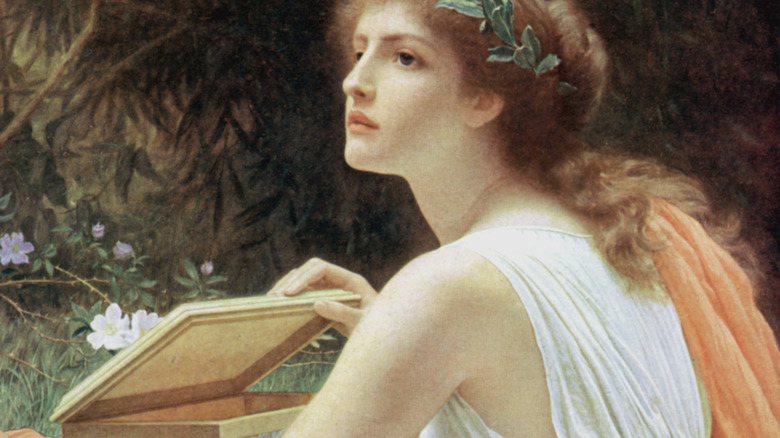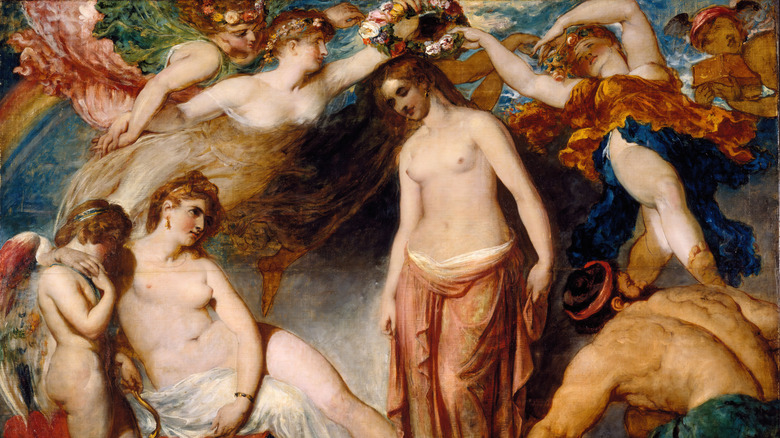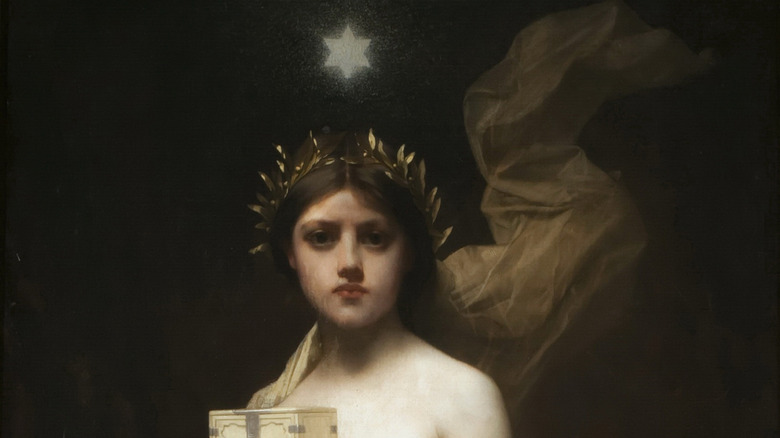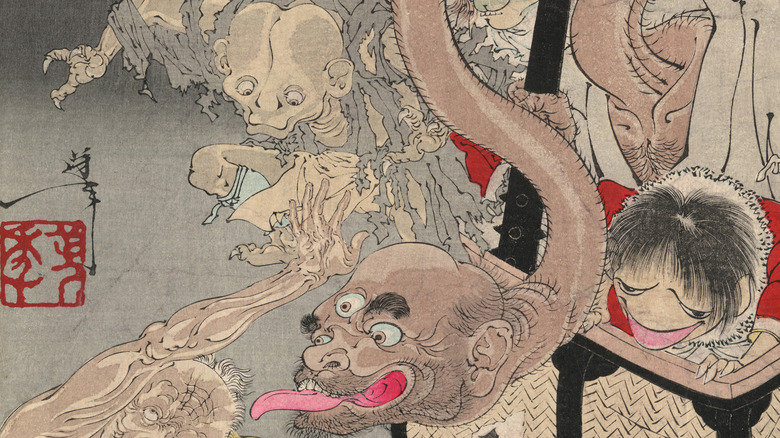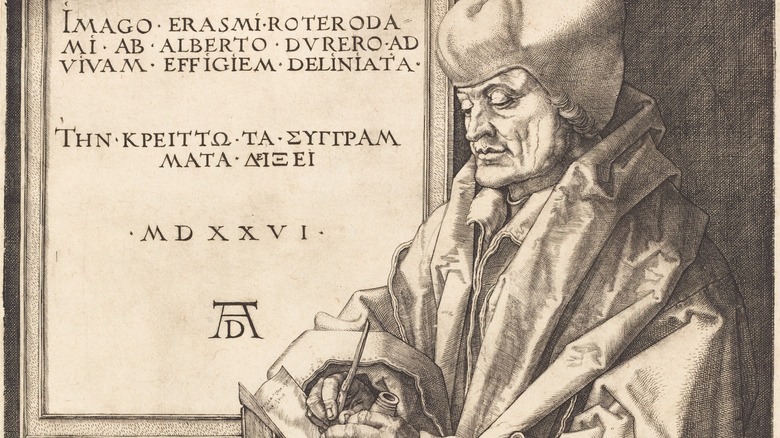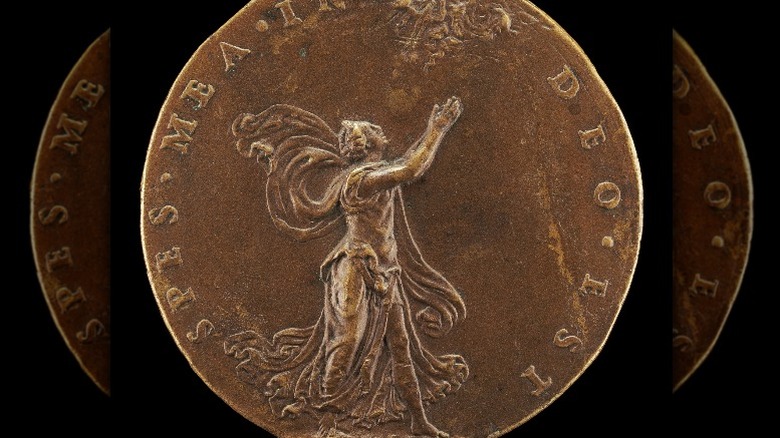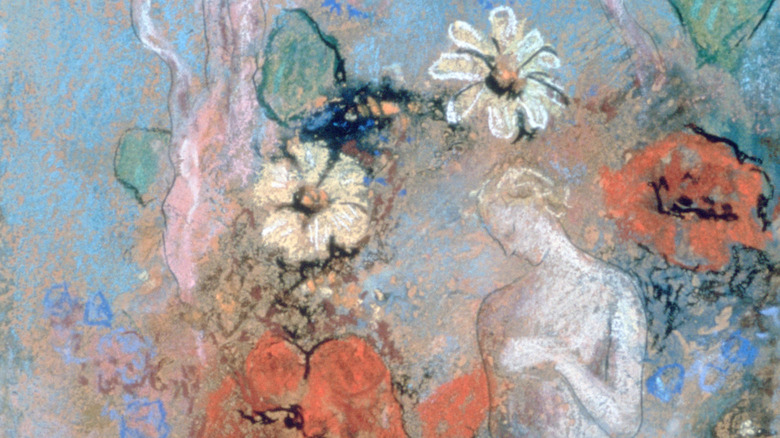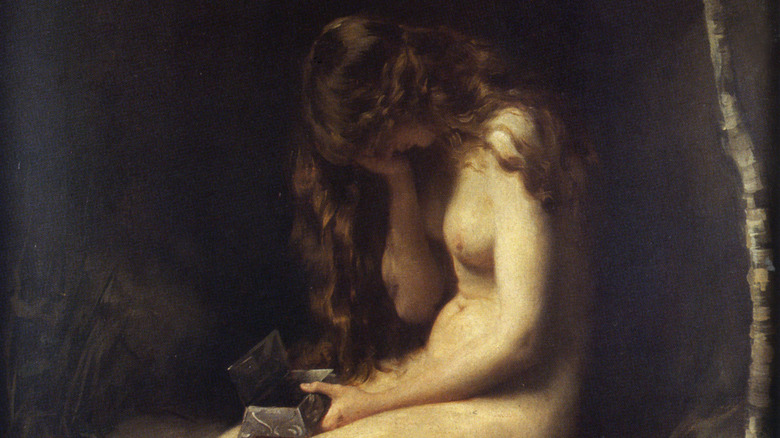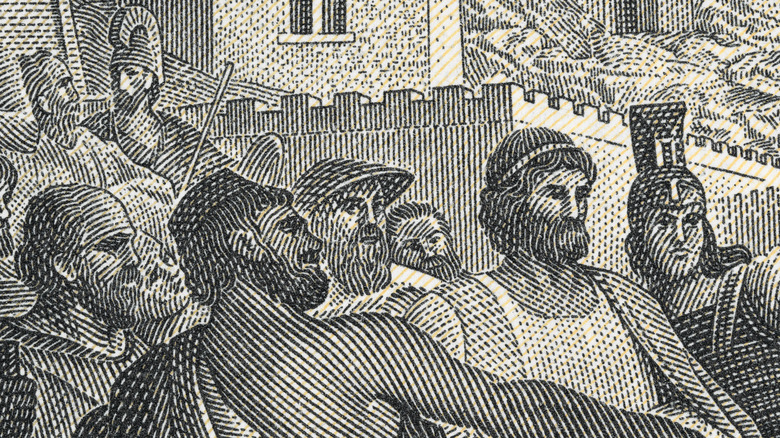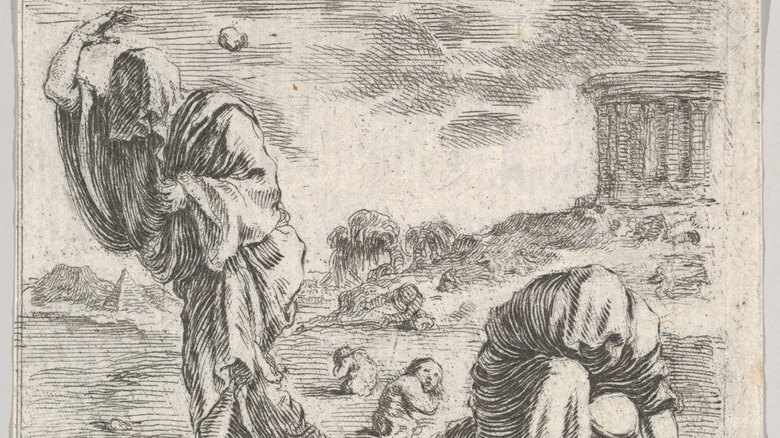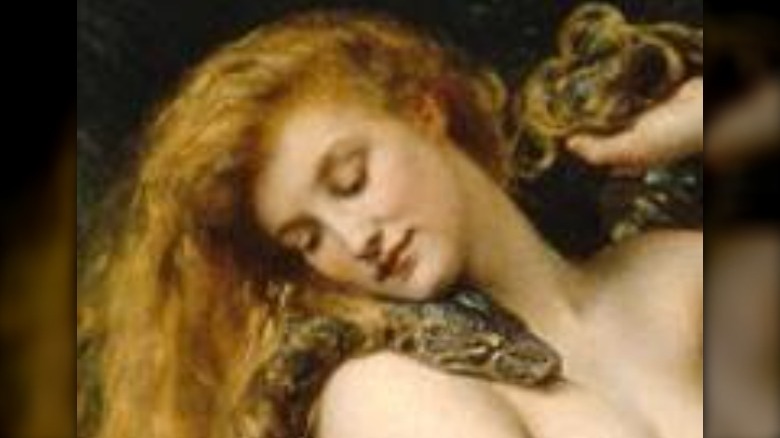The Mythology Of Pandora Explained
Just about everyone has heard another person say something to the effect of, "well, now, looks like they are about to open Pandora's box with that decision." Or, if not that, then one has probably heard of the music application Pandora, which got its name from the same story. And most of us know, at least nominally, what is meant by that particular phrase. It is mostly within a negative context. Whatever the action spoken about is going to lead to a set of bad consequences.
The very first use of the phrase, in this sense, was in 1579, according to Merriam-Webster. However, there are probably quite a few, if not a majority, that do not know the exact origins of that phrase and the woman who became the object of the negativity behind it. So with that in mind, let us open up the Pandora's box and see if blessings or curses come flooding out. Here is the mythology of Pandora explained.
Pandora's Creation
In the beginning ... there were two titans, Prometheus and Epimetheus, who were given charge over creating the animals and humanity on earth as a gift from Zeus. According to "Gods and Robots," by Adrienne Mayor, Epimetheus created the animals and gave them all the protections the two were allowed to use. But once Prometheus had made all of humanity, they had no protections. So he stole the fire that was meant for the gods and gave it to humanity. At this, Zeus was very angry and chose to get even with humanity for accepting the gift, so he had a mortal made in "the likeness of a shy maiden" that would be the "evil thing" to punish man, as per Hesiod's "Theogeny." However, at this time, Hesiod had not given this mortal a name. That would come later.
The god of fire, Hephaestus, created this maiden out of earth while Aphrodite posed for him (via Greeka). The girl who would become Pandora was made in the image of a god. Aphrodite gave her grace, Hermes gave her cunning, Athena clothed her, and Poseidon gave her a necklace that would keep her from drowning. However, it was Hera that gave her the curiosity that would be her downfall, or at least according to the story that has most popularly been shared. Her name means "all-gifted" due to the gods' part in her creation.
Pandora was the first woman
Apparently, when Prometheus created all of humanity, he didn't think to make any women. The implication is that, before the creation of Pandora, all of humanity were men, which made her the first mortal woman, as per Britannica. Yet the underlying connotation of this whole mythology was that this mortal woman would be the downfall of humanity, and it would come to fruition by way of her curiosity.
Marguerite Johnson in an article for The Conversation noted how the mythology of Pandora and the account of Adam and Eve and their fall from grace in the Christian scriptures speak to a similar feature of being a woman: "Men must work hard because they were complicit in disobeying divine powers; women must be ruled by men because they were disobedient and curious." Johnson goes on to call the myth of Pandora a truly "feminist nightmare." It does appear, on simple glances, that a good portion of ancient literature views women askance — if not women in general then often the first woman. Pandora, in this sense, is no different.
Pandora's Box
Once Pandora had been created and gifted by all the gods, Zeus ordered Hermes to deliver her to humanity by way of Epimetheus who, upon seeing her, loved her and wanted her as his wife, as per the Theoi Project. They got married, and Zeus gave Pandora a jar for their wedding present. This is where Pandora's curiosity from Hera creates the narrative action of the mythology. She wanted to know what was inside, so she opened it and all of the evils, sickness, toil, and sin was released upon humanity. Seeing what was inside, Pandora quickly shut it again when all that was left inside was Elpis, or hope (via Interesting Literature).
This story becomes, then, a "fall of humanity" story just like that within the texts of the three major religions. Katie Brown notes in The Collector that many of these creation myths share much in common: "Humans that were originally formed from clay, the acquisition of knowledge and free-will as a central aspect of the tale, and a woman taking the blame for human suffering, are all common themes in creation mythology." She notates the specific similarities between the myths of Pandora and of Eve in their specific falls from grace leading to the "original sin" within Christian theology. In this way, Pandora might have been a precursor to the biblical Eve.
Is it a jar or a box?
According to Merriam-Webster, in the case of "pithos," the word actually means "storage jar" in the original Greek. Wait, so, hold up, wasn't this all about "Pandora's Box"? Here is the discrepancy. Somewhere down the line of the word's translation throughout history, the storage jar became a box. In an article for Oxford University Press, William Hansen states the "international expression 'Pandora's box' goes back to a mistranslation by Erasmus of Rotterdam, who rendered Pandora's pithos 'jar' as pyxis 'box' when he retold the myth in Latin in 1508."
However, Thought Co. states that the mix-up happened later on in the 16th century when writer Lilius Giraldus of Ferrara used the word pyxis (or casket) Pandora's box full of evils. He goes on to say that while the translation was in error, it at least was a meaningful one in that "pyxis" means "whited sepulcher" or "a beautiful fraud," which parallels the creation narrative of Pandora.
What's in the box?
As the myth goes, there is one thing left in the jar (or box) when Pandora finally closes it. That is "Elpis," which in Greek mythology is "the personification of hope" and the daughter of Nyx, or the primordial deity that is the personification of night (via Greek Mythology). Hesiod, in his poem, did not specify what the jar meant metaphorically, so the fact that all the evils of the world are let out, but hope is kept in the jar seemingly muddles the meaning. This is where the interpretations vary across the board.
John G. Messerly, former philosophy lecturer at University of Texas, pondered whether hope within this mythology was an evil (since it was housed with the rest of the evils) or good (the general understanding of hope). He gives his own interpretation: "Perhaps hope was originally another evil but after being opened hope was transformed into good hope. It's as if hope, separated from evil, takes on a new character. So its preservation in the jar preserves this good hope which can then (somehow) be accessed when needed." According to Friedrich Nietzsche in "Human, All Too Human," he says that hope according to the myth of Pandora is "the most evil of evils because it prolongs man's torment." In this sense, hope remaining within the console of humanity means that Zeus could continue to subject people to the toils and sins anew without them perishing.
The other versions of Pandora's box
Depending on the version that one reads and bases their interpretation on, there is another version of Pandora's box. According to "Theology and Practice in Early Christianity," Troy Martin illuminates the differences in the versions told by the ancients. He states that the probable earlier version of the myth had Pandora opening up a jar full of blessings that all fly back to Zeus, the source of all the blessings, leaving only hope to keep humanity able to endure the toil of their existence. However, the Hellenists were the ones who popularly told the myth with the evils inside the jar.
This version of the myth with the blessings is also told by way of Aesop's Fables. In Laura Gibbs translation of the fable, Zeus left all the "useful things" in the hands of man, who was noted to have no self-control. "So he pushed the lid aside, letting those things go back to the abode of the gods" (via Aesopica). Within this version, it is not even Pandora who opens the jar, but "man." The guilt of the action is seemingly more broad. There is also a version often in art works, like one by Giulio Bonasone, that says it was Epimetheus who opened the jar and not Pandora.
The issue of blame
With all of these versions and the Hesiod poem not even naming Pandora, how did Pandora become the central figure of guilt and blame for unleashing all evils into the world? The Collector notes that Pandora was set up to fail, and that imagery begat symbolism then begat practice throughout history. In Hesiod's work, Pandora was specifically created as punishment for mankind. "The gods give her the box with the intention that she will open it and unleash torment upon mankind, and she is driven by the paradoxical 'gift' of curiosity to open it, releasing all manner of evil into the world," as researcher Katie Brown notes (via The Collector).
Yet many forget that her creation and actions were the consequence of Prometheus disobeying Zeus in the first place. As N.S. Gill puts it, "Pandora is a trick gift, a punishment for the good of Promethean fire, she is, in fact, Zeus's price of fire" (via Thought Co.). William Hansen notes that Pandora "may act from malice, indifference, curiosity, or something else," but Hesiod does not make it plain — instead he seems to care more "that it is a woman who does so" than why the event had to happen at all (via Oxford University Press).
The end of the golden age of man
According to N.S. Gill, during the Golden Age of Man (one of the five Greek ages of man),mortals never knew suffering, were always pretty happy, lived in an eternal spring, and actually aged backwards, as per Thought Co. This age was the first and the height of the ages of man, according to Hesiod. Each successive age (Silver, Bronze, the Age of Heroes, and Iron) followed a downward trajectory of depletion, toil, and sorrow for humanity.
The end of the Golden Age of Man is often tied to two events. First was the loosing of evils into the world by Pandora when she opened the jar given to her by Zeus, according to Greek Mythology. The second, too, revolves around Zeus as he and the other gods defeated the Titans within the 10-year war known as the Titanomachy (via Thought Co.). Humanity would never achieve their god-likeness again after this age, which parallels with the texts of various other religions.
Pandora's Daughter, Pyrrha
From the marriage of Pandora and Epimetheus came Pyrrha who, too, was very fair according to the mythos. Pyrrha would end up marrying the son of Prometheus, Deucalion, who was "known for his rightful character and good advice." Due to the defeat of the Titans by Zeus and the opening of Pandora's jar, the human situation on earth was ripping apart at the seams, and so Zeus decided to send a great flood to wash away all the people and animals sparing only Pyrrha and Deucalion (via Greeka).
As Greek Mythology details, in order to repopulate they earth, the couple sought out an oracle who told them to throw the bones of Deucalion's mother behind them, which they took to mean Gaia, the earth goddess. The bones they figured were rocks. As they threw them behind their backs and they hit the ground, they became human beings. The rocks thrown by Deucalion became men and those by Pyrrha became women. However, they had several children together as well. Because of the flood and the recreation of humanity, this would make Pandora the grandmother of all humanity.
Pandora, Eve, Lilith, and Hawwa
Pandora and Eve share much in common including, according to The Collector, their central roles in stories that transition from prosperity and ease to suffering and death, as well as the fact they were both created after men and given to temptation that brings evil to humanity. According to Islam Religion, much of the Christian and Jewish accounts of the creation of Eve are also in the Quran and hadiths of Muhammad. However, the one area where they drastically differ is that the Quran and Muhammad at no point put the blame of sin on Eve (Hawwa in Arabic) but on both man and woman, and that original sin did not come into the world.
However, as far as first women go, the one that departs the furthest from this general creation narrative is Lilith. According to the Alphabet of Ben Sira (via Jewish Women's Archive), Lilith was the first wife of Adam who, also, was made from the ground. The couple argued about her being submissive to the point where Lilith said the name of God and was taken into the sky. She became a demon in various traditions who would affect childbirth and sicken newborns. It seems that being made of a different substance or being is what delineates the hierarchy of many creation narratives.
When Pandora Meets AI
The applications of the themes and metaphors of this mythology are significant — everything from political policies to medicine and ... artificial intelligence? Adrienne Mayor in an article for Project Syndicate recasts the myth in the language of AI by viewing Pandora — more in line with the radio station application's interpretation — as "a lifelike android created to look like a bewitching maiden. Her purpose was to entrap mortals as a manifestation of kalon kakon: 'evil hidden in beauty.'" She goes on to state that Prometheus meant "foresight" and Epimetheus meant "hindsight" and warned us all to be Promethean and not Epimethean in our approach to new technologies. Even the sense of hope in the myth has a dark side, according to Mayor, who says that the Greeks viewed hope as nothing more than wishful thinking, nothing that would actually come to fruition.
In a paper by Kingsley Dennis for First Monday, he ponders on whether innovations in wireless and neuro–technologies might shift human behavior towards a "psycho–civilized society, where greater emphasis is placed upon forms of social control and pre–emptive strategies." The question of how people accept technology unquestioningly recalls the mythos of Pandora's curiosity and Epimetheus' hindsight. Sometimes one should not know what is in the box.
Pandora's Box and Covid-19
In a piece for Pressenza, Karina Lagdameo-Santillan speaks to the element of hope that presides in the mythology of Pandora over and against the likes of those that might descend into despair like Friedrich Nietzsche and some of the most extreme technology alarmists. By bringing in the verse of Andrea Alciato in "Emblemata" from 1534, she reminds us that while the realization of hope in the midst of pandemics like the Coronavirus might be hard to see, it remains with us for it "alone stayed behind at home when evils fluttered all around." It is clearly the waiting for the realization that hope promises that remains the hardest part.
Yet for every complicated element of hope within the Pandora mythology that is alluded to, there is just as many or more that recount the act of opening the box and releasing the ills into the world. In May of 2021, Nicolas Wade wrote a lengthy piece for The Bulletin of the Atomic Scientists titled "The origin of COVID: Did people or nature open Pandora's box at Wuhan?" where he breaks down the potential theories about where the origin of Covid-19 actually lies. The mythos of Pandora and her "box" remains potent in culture and society to this day. It contains multitudinous ways of enacting its metaphorical heft especially in the midst of worldwide pandemics.
